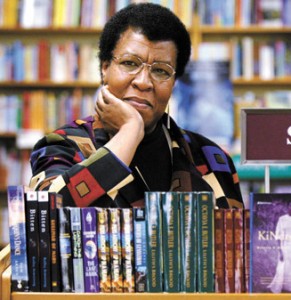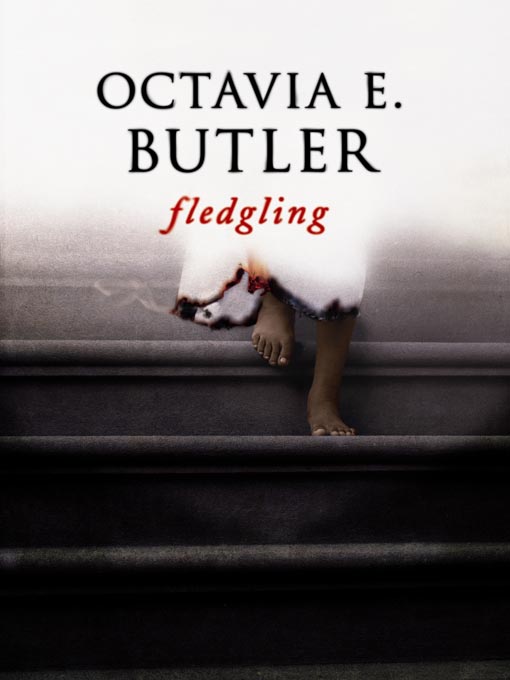Octavia E. Butler’s Fledgling is two books in one. Like a pre-fab house with the world’s most fascinating basement, everything above ground feels thin and standard issue, but lurking beneath is a troubling look at slavery from the point of view of a sympathetic slave master, who never quite realizes what she is.
The primary narrative of Fledgling concerns a character named Shori, who awakens without her memory following an unknown violent tragedy. Shori, it turns out, is an Ina, a race of humanoids that developed in parallel to humanity who are, basically, vampires. They suck blood, the sun hurts them, they live almost forever, and they have what anyone who was into Vampyre the Masquerade can tell you are thralls, humans whom they have bewitched through repeated biting. Except here, the thralls are called Symbionts. They provide a steady food source and other somewhat vague physiological benefits to their Ina, and in turn they get to live for around two hundred years, are immune to disease, and get a whole host of other benefits.
The novel’s plot revolves around Shori trying to relearn who she is and, eventually, find justice for the murder of her parents, her siblings, and her first group of human Symbionts. While excellently plotted, the actual story of Fledgling leaves much to be desired. Often, the story appears to be an excuse to do a lot of world-building about Ina that never fully pays off, and a kind of Mary Sueism leaks into the book’s protagonist. There is nothing wrong with Shori as a character beyond her memory loss. She is completely devoid of flaws, and all her struggles are external in nature. She spends nearly all the book being told by everyone around her how great she is. She is physically and intellectually superior to every other character in the book. Her only seeming fault—her temper, which arrives abruptly right before she is told she needs to learn to control it—is only a challenge because the hidebound rules of Ina decorum frown on it. The villains in the book are essentially Nazis, and there’s never any question about whether justice will be done during Fledgling’s courtroom drama second half, because Ina can smell whether or not people (or fellow Ina) are lying. The allegorical aspects—Shori is black and all other Ina are white, Shori is the product of genetic mingling between humans and Ina etc.—are transparent and heavy handed. It’s a fun page-turner, good for a lazy weekend or long flight, but not exactly up to Butler’s well-deserved reputation as a trailblazing science fiction writer.
Again, ignore the house and take a trip down to its basement. Pry up the floorboards and look around a bit for the bodies buried there, and you find much more fascinating material. As Noah discussed recently, Fledgling is a book that works in part by trapping you in the narrator’s head. Shori and the reader have a kind of soul-bond. As she has lost her memory, we begin in the exact same place as she does, learn what she learns, when she learns it. We never escape her subjectivity; her experience is our experience. But as in many books with a clearly defined first person narrator, there are paths into that experience that Shori can’t see, but that we are free to roam around in and explore.
This different understanding largely revolves around Symbionts, or as we would probably call them, slaves. The bond with Symbionts is formed through a venom the Ina infect them with. After a few bites, the venom is addictive and, if a Symbiont is ever separated from their Ina for too long, fatal to the Symbiont. It also destroys their free will. Not only are they unable to disobey their Ina’s command, once bitten even for the first time, they feel pulled towards the Ina, wanting what the Ina wants, wanting to serve. Once bound, Symbionts will die if separated from their Ina for to long.
Thus, even though the Ina talk about the ethics of their Symbiont system with quite a bit of lofty rhetoric about consent, consent is actually impossible. Once bitten for the first time, a prospective Symbiont is going to want to be a Symbiont, because they are going to want to please the Ina who has bitten them. The only regime governing how Ina treat their Symbionts are social norms. The current norms are egalitarian. Symbionts are supposed to consent to becoming Sumbionts, you aren’t supposed to boss them around unless absolutely necessary—a necessity that comes up far more often than the well meaning liberal Ina would like to admit—and talking about them like they are inferior is gauche. The villainous Silk family use their Symbionts as pawns and, we are led to believe, treat them barbarously, and there is nothing the other Ina can (or want to) do about it. The eventual trial revolves largely around the Silk’s crimes against Shori’s family, short of outright murder, there is nothing Ina are legally forbidden from doing with their Symbionts.
Having lost her memory, Shori is free from the socialization of having grown up the benefactor of an oppressive social order. Shori adores her Symbionts, and feels closely tied to them, and something about this system troubles her, even if she remains unable to articulate what it is. All of that articulation is left up to her “first” (Ina must have a group of Symbionts so they don’t kill them by feeding from them too often and the feeding process is overtly sexual, so the Ina-Symbiont relationship comes to resemble a shared marriage with a primary partner and several secondaries), a white man named Wright. Shori binds Wright to her before she re-learns what the Symbiont-Ina relationship entails, and he grows increasingly resentful about his role and their relationship as the novel progresses. While some of this is couched as a critique of heteronormativity—he’s angriest at having to share her with another male Symbiont—you can feel Fledgling pull sympathetically towards Wright’s problems with the world he has been forced into. Late in the novel, Shori casually takes up the Ina habit of replacing a Symbiont’s last name with the word “sym” and the name of the Ina they are bound to, erasing the human’s individuality. Wright responds:
“Sym Wayne?” Wright said, frowning. “Is that how you say it, then, when someone is a symbiont? That’s what happens to our names? We’re sym Shori?”
“You are,” I said.
“Something you remembered?”
“No. Something I learned from hearing people talk.”
The moment of a forced name-change is an important plot point in many slave narratives, from Roots to 12 Years a Slave, whose action is only resolved when Solomon Northrup reclaims his name. It’s vital that this moment comes late in the book, after Shori has begun to be welcomed into Ina society. As she becomes more Ina, her patience for the very human needs and dignities of her Symbionts lessens, and her complicity in their oppression becomes less noticeable to her.
Wright never breaks with Shori. In fact, his growing discontentment goes nowhere. Other Ina assure Shori that Wright will “come around” one day, but there’s no real evidence that this is true. He has no choice but to stay with Shori, and, while he’s in love with her, is unclear whether or not that love is real.
Fledgling is much trickier than it initially seems. While its surface story is a straightforward allegory about race and white supremacy, its b-plot takes the same victim of oppression and turns her into an oppressor. The book further scrambles our ready-made categories by situating the narrative inside the head of a black, female slave master and making a white man the voice of human dignity. It’s a fascinating and troubling look into how systems of oppression justify and perpetuate themselves, told from the perspective of someone who thinks they’re in a YA supernatural coming of age novel.
It could be that part of why Fledgling feels so unsatisfying as a novel yet so thematically rich is because it was conceived as being part of a series. There’s no evidence of this beyond the text itself, other than Butler’s penchant for serialization. But it could be that the plot feels unfinished because its primary purpose was to keep us interested while we learned a hundred pages or so of exposition about Ina customs, history, biology and religion that would be important later. It could be that Wright and Shori’s relationship—the key relationship in the book, and, at first, its apparent subject—does not resolve in this book because it was meant to in a future volume. This would help explain why Shori’s arch-enemies are left alive in the book’s conclusion as she goes to live with a new family that has not been fully developed yet, and why the book hints at growing factionalism within the Ina, pinned to the question of the species’ origin, that may break out into civil war.
Sadly, we’ll never know. Fledgling, Octavia E. Butler’s first book after a lengthy hiatus, would prove to be her last. She died suddenly, as the story goes, on book tour, promoting it. Of all the aspects of Fledgling that are richly, deliciously troubling, this may be the most. That Butler wrote a book in part about people so desperate to cheat death and loneliness that they would agree to be enslaved, right before her own life was cut so tragically short.


